
Agatha Gregson, née Wooster, later Lady Worplesdon, is a recurring fictional character in the Jeeves stories of British comic writer P. G. Wodehouse, being best known as Bertie Wooster's Aunt Agatha. Haughty and overbearing, Aunt Agatha wants Bertie to marry a wife she finds suitable, though she never manages to get Bertie married, thanks to Jeeves's interference.

Bertram "Bertie" Wilberforce Wooster is a recurring fictional character in the comedic Jeeves stories created by British author P. G. Wodehouse. A young English gentleman and one of the "idle rich", Bertie frequently appears alongside his valet, Jeeves, whose intelligence manages to save Bertie or one of his friends from numerous awkward situations. As the first-person narrator of ten novels and over 30 short stories, Bertie Wooster ranks as one of the most vivid comic creations in popular literature.

The Inimitable Jeeves is a semi-novel collecting Jeeves stories by P. G. Wodehouse, first published in the United Kingdom by Herbert Jenkins, London, on 17 May 1923 and in the United States by George H. Doran, New York, on 28 September 1923, under the title Jeeves.

"Jeeves Takes Charge" is a short story by P. G. Wodehouse, and features the young gentleman Bertie Wooster and his valet Jeeves. The story was published in the Saturday Evening Post in the United States in November 1916, and in The Strand Magazine in the United Kingdom in April 1923. The story was also included in the 1925 collection Carry On, Jeeves.

"Jeeves in the Springtime" is a short story by P. G. Wodehouse, and features the young gentleman Bertie Wooster and his valet Jeeves. The story was published in The Strand Magazine in December 1921 in London, and in Cosmopolitan in New York that same month. The story was also included in the 1923 collection The Inimitable Jeeves as two separate chapters, "Jeeves Exerts the Old Cerebellum" and "No Wedding Bells for Bingo".

"The Great Sermon Handicap" is a short story by P. G. Wodehouse, and features the young gentleman Bertie Wooster and his valet Jeeves. The story was published in The Strand Magazine in London in June 1922, and then in Cosmopolitan in New York that same month. The story was also included in the collection The Inimitable Jeeves as two separate stories.
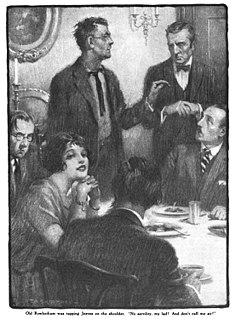
"Comrade Bingo" is a short story by P. G. Wodehouse, and features the young gentleman Bertie Wooster and his valet Jeeves. The story was published in The Strand Magazine in London in May 1922, and in Cosmopolitan in New York that same month. The story was also included in the 1923 collection The Inimitable Jeeves as two separate chapters, "Comrade Bingo" and "Bingo Has a Bad Goodwood".
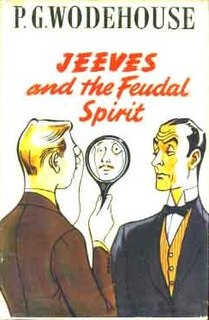
Jeeves and the Feudal Spirit is a comic novel by P. G. Wodehouse, first published in the United Kingdom on 15 October 1954 by Herbert Jenkins, London and in the United States on 23 February 1955 by Simon & Schuster, Inc., New York, under the title Bertie Wooster Sees It Through. It is the seventh novel featuring Bertie Wooster and his valet Jeeves.
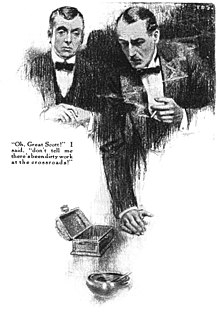
"Aunt Agatha Takes the Count" is a short story by P. G. Wodehouse, and features the young gentleman Bertie Wooster and his valet Jeeves. The story was published in The Strand Magazine in London in April 1922, and then in Cosmopolitan in New York in October 1922. The story was also included in the 1923 collection The Inimitable Jeeves as two separate chapters, "Aunt Agatha Speaks Her Mind" and "Pearls Mean Tears".
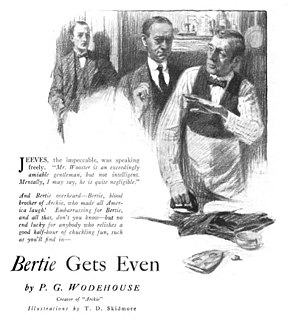
"Scoring off Jeeves" is a short story by P. G. Wodehouse, and features the young gentleman Bertie Wooster and his valet Jeeves. The story was published in The Strand Magazine in London in February 1922, and then in Cosmopolitan in New York in March 1922. The story was also included in the 1923 collection The Inimitable Jeeves as two separate chapters, "The Pride of the Woosters Is Wounded" and "The Hero's Reward".

"Sir Roderick Comes to Lunch" is a short story by P. G. Wodehouse, and features the young gentleman Bertie Wooster and his valet Jeeves. The story was published in The Strand Magazine in London in March 1922, and then in Cosmopolitan in New York in April 1922. The story was also included in the 1923 collection The Inimitable Jeeves as two separate chapters, "Introducing Claude and Eustace" and "Sir Roderick Comes to Lunch".

"Jeeves and the Chump Cyril" is a short story by P. G. Wodehouse, and features the young gentleman Bertie Wooster and his valet Jeeves. The story was published in the Saturday Evening Post in New York in June 1918, and in The Strand Magazine in London in August 1918. It was also included in the 1923 collection The Inimitable Jeeves as two separate chapters, "A Letter of Introduction" and "Startling Dressiness of a Lift Attendant".
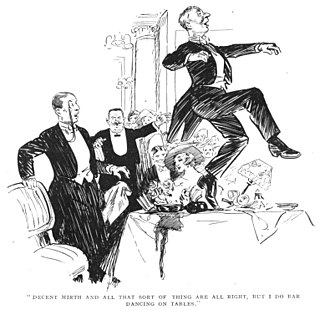
"Jeeves and the Unbidden Guest" is a short story by P. G. Wodehouse, and features the young gentleman Bertie Wooster and his valet Jeeves. The story was published in the Saturday Evening Post in the United States in December 1916, and in The Strand Magazine in the United Kingdom in March 1917. The story was also included in the 1925 collection Carry On, Jeeves.

"Jeeves and the Hard-boiled Egg" is a short story by P. G. Wodehouse, and features the young gentleman Bertie Wooster and his valet Jeeves. The story was published in the Saturday Evening Post in the United States on 3 March 1917, and in The Strand Magazine in the United Kingdom in August 1917. The story was also included in the 1925 collection Carry On, Jeeves.
"Without the Option" is a short story by P. G. Wodehouse, and features the young gentleman Bertie Wooster and his valet Jeeves. The story was published in the Saturday Evening Post in the United States in June 1925, and in The Strand Magazine in the United Kingdom in July 1925. The story was also included in the 1925 collection Carry On, Jeeves.
"Clustering Round Young Bingo" is a short story by P. G. Wodehouse, and features the young gentleman Bertie Wooster and his valet Jeeves. The story was published in the Saturday Evening Post in the United States in February 1925, and in The Strand Magazine in the United Kingdom in April 1925. The story was also included in the 1925 collection Carry On, Jeeves.
"Jeeves and the Impending Doom" is a short story by P. G. Wodehouse, and features the young gentleman Bertie Wooster and his valet Jeeves. The story was published in The Strand Magazine in the United Kingdom in December 1926, and in Liberty in the United States in January 1927. The story was also included as the first story in the 1930 collection Very Good, Jeeves.
"The Love that Purifies" is a short story by P. G. Wodehouse, and features the young gentleman Bertie Wooster and his valet Jeeves. The story was published in The Strand Magazine in the United Kingdom in November 1929, and in Cosmopolitan in the United States that same month, as "Jeeves and the Love that Purifies". The story was also included as the eighth story in the 1930 collection Very Good, Jeeves.
"Indian Summer of an Uncle" is a short story by P. G. Wodehouse, and features the young gentleman Bertie Wooster and his valet Jeeves. The story was published in The Strand Magazine in the United Kingdom in March 1930, and in Cosmopolitan in the United States that same month. The story was also included as the tenth story in the 1930 collection Very Good, Jeeves.















